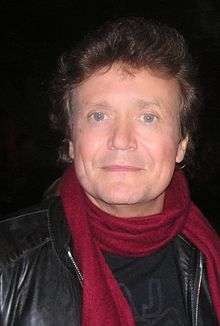Jochen Kowalski
Jochen Kowalski (born 30 January 1954) is a German alto or mezzo countertenor, noted for his very rich timbre.

Early life
Jochen Kowalski was born in Wachow, a small village belonging to the city of Nauen, in East Germany, as the son of a butcher of Polish origin. His parents gave him a musical education. In 1977 he began his studies as a Heldentenor, specializing in Wagner, but when it became clear he was able to sing "Che farò senza Euridice?" as a stand-in Jochen was sent to Theo Adam and switched to countertenor. Kowalski specialized in baroque and classical music. He received his training at the Hanns Eisler Music Conservatory in East-Berlin, in particular with the vocal pedagogue Marianne Kupfer-Fischer.[1]
Career
After completing his studies in 1983, Jochen Kowalski was engaged as soloist at the Komische Oper (Comic Opera) in Berlin. In 1984 he sang the title role in Georg Frideric Handel’s Giustino, staged by Harry Kupfer. The artist drew international attention through his performance of Orpheus in Gluck’s Orfeo ed Euridice in a new staging of the work in December 1987, and in the travelling production by the Comic Opera in August 1989 in London. Kupfer's Orpheus wears a leather jacket and carries an electric guitar in this innovative interpretation.
In 1984, Jochen Kowalski made his debut with the State Opera of Hamburg singing the role of Daniel in G.F. Handel’s oratorio Belshazzar in Harry Kupfer’s staged realization under the musical direction of Gerd Albrecht. Since then he has been under contract at the State Opera, where he has also distinguished himself in many solo concerts. In 1987 and 1988, Kowalski appeared at the Netherlands Opera in Amsterdam and the Grand Opera in Paris. He made his debut in the State Opera in Vienna and at the Royal Opera House Covent Garden in London in 1991, both times as Prince Orlofsky in Die Fledermaus. He made his debut at the Metropolitan Opera in 1994 in the same role. In 1995 he took part in the Salzburg Festival. He has established a reputation as a concert and oratorio singer in the major musical centres of Europe, the USA and Japan, working with such conductors as Gary Bertini, Neville Marriner, Vittorio Negri, Zubin Mehta, and Nikolaus Harnoncourt, among others. He has performed in Austria, France, Japan, Netherlands, United Kingdom, and the United States and is well received by critics.[2]
Kowalski is still a member of the Comic Opera ensemble, and performs in the Volksbühne. One of his favourite singers is Lotte Lehmann; then there are Franz Völker and Fritz Wunderlich. Kowalski lives in Pankow in the north of Berlin. In 2013 a biography was published: Der Countertenor Jochen Kowalski. Gespräche mit Susanne Stähr. Henschel Verlag, Leipzig. ISBN 978-3-89487-930-3.
References
- "Jochen Kowalski". Retrieved 23 December 2011.
- Gruber, Paul (1993). The Metropolitan Opera guide to recorded opera. Metropolitan Opera Guild. p. 163. ISBN 0393034445.